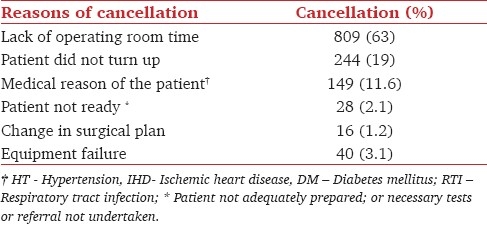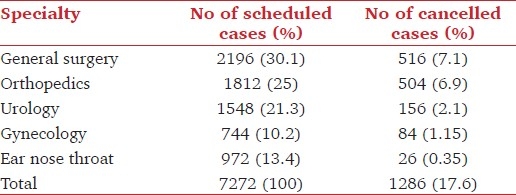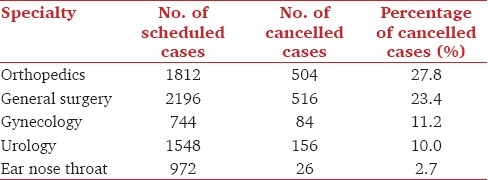Abstract
Background:
Cancellation of operations in hospitals is a significant problem with far reaching consequences. This study was planned to evaluate reasons for cancellation of elective surgical operation on the day of surgery in a 500 bedded Government hospital.
Materials and Methods:
The medical records of all the patients, from December 2009 to November 2010, who had their operations cancelled on the day of surgery in all surgical units of the hospital, were audited prospectively. The number of operation cancelled and reasons for cancellation were documented.
Results:
7272 patients were scheduled for elective surgical procedures during study period; 1286 (17.6 %) of these were cancelled on the day of surgery. The highest number of cancellation occurred in the discipline of general surgery (7.1%) and the least (0.35%) occurred in Ear-Nose-Throat surgery. The most common cause of cancellation was the lack of availability of theater time 809 (63%) and patients not turning up 244 (19%) patients. 149 cancellations (11.6%) were because of medical reasons; 16 (1.2%) were cancelled by the surgeon due to a change in the surgical plan; 28 (2.1%) were cancelled as patients were not ready for surgery; and 40 (3.1%) were cancelled due to equipment failure.].
Conclusion:
Most causes of cancellations of operations are preventable.
Keywords: Audit, dosing schedules, morphine
Introduction
Operation theater (OT) is the heart of a hospital requiring considerable human resources and expenditure from hospital budget. However, OTs are underutilized and lie idle at times. Many patients who are called for operation from waiting list are not operated upon.[1,2] A significant amount of work needs to be undertaken to prepare the patient for a surgical procedure. This includes the patient notes being written on the day of admission, the consultant taking the time to review the notes, OT staff ensuring the correct surgical instruments are available, ward staff preparing the ward for the patient, secretarial staff preparing theatre lists, the patient preparing self for admission to hospital, and preparations for postoperative care. Last minute cancellations result in inefficient use of resources, not in the interests of the patient or the hospital, and result in lost capacity.[3]
Cancellation of elective operations is a parameter to assess quality of patient care and quality of management system. The reported incidence of cancellation in different hospitals ranges from 10% to 40%. There are many reasons of cancellation of elective surgical cases; and they differ from hospital to hospital.[4] Unexpected operating room (OR) cancellations are traditionally divided into avoidable cancellations (e.g., scheduling errors, equipment shortages, and cancellation due to inadequate preoperative evaluation) and unavoidable cancellations (e.g., emergency case superseding the elective schedule, unexpected changes in the patient's medical status, or patient nonappearance). The most common factor which has led to cancellation is lack of OR time.[4]
The aim of this prospective study was to analyze the causes of cancellation of elective procedures in a multidisciplinary 500 bedded government hospital and to suggest measures for optimal utilization of OR time.
Materials and Methods
All patients scheduled to undergo elective surgical procedures, between December 2009 to November 2010, at our 500 bedded hospital were prospectively enrolled in the study. As this study was considered as audit under quality assurance project, it did not require approval of the hospital ethics committee.
Data on operations scheduled for weekdays, excluding public holidays, were obtained from the OT list for that day. This list is generated at 14:00 h the previous day. Copies of the supplementary form used to make additions to this list were obtained. The OT list provided patient and surgeon details, intended procedure, OT used, and estimated duration of each operation. After an operation, details are entered into an OT database and passed on to the hospital patient information system. From this, patient demographic characteristics, morbidity, category (ward, day-of-surgery, day-only, or emergency admission), and date and actual time of start and end of surgery were taken. For this study, emergency admissions were defined as admissions which were unplanned.
A cancellation on the day of intended surgery was defined as any operation that was either scheduled on the final OT list for that day (generated at 14:00 on the previous day) or was subsequently added to the list and that was not performed on that day. During the day of surgery, OT staff compiled a list of cancellations. The form for this included a column for “classification and comment,” where theatre staff recorded a reason for the cancellation. We obtained copies of these lists each day. In addition, the reason for each cancellation was investigated on the following working day, by checking in person or by telephone with:
Staff of the booking office;
For day-only and day-of-surgery admissions, the day-only ward records (“sticky label book”) and senior clerical and nursing staff; and
For ward patients, the clinical case coordinators or senior resident of the respective wards.
For cancellations where no reason was recorded on the cancellation list or the recorded reason was inconsistent with that reported by staff, the patients’ clinical records were audited. If the reason was still not clear (i.e., there were gaps in the reasoning or the reason given was not consistent with events in the clinical record), the registrar or surgeon was asked.
Cancellations were classified as:
Potentially avoidable (no OT time, no postoperative bed, list error, administrative cause, equipment or transport problem, communication failure, patient not ready, and no surgeon available); or
Nonavoidable (cancelled by patient, patient clinical change, emergency priority, patient not ready, and no surgeon available).
As this classification was based on the detailed reason given for the cancellation, some of the six major categories appear in both the avoidable and unavoidable groups. For example, “patient not ready” could be due to failure to adequately prepare the patient (avoidable) or to a factor outside the control of hospital staff, such as that the patient did not fast (unavoidable).
Results
A total of 7272 patients were scheduled for elective surgical procedures during 12-month study period. The total number of surgical operations performed was 5986.The OT was functional for 231 days during the study period, resulting in 25.9 cases per day. The total number of patients cancelled on the day of surgery was 1286 (17.6 %), resulting an average of 5.5 cancellations per day. 809 patients out of 1286 (63%) was cancelled due to lack of availability of OT time; patients not turning up resulted in 244 (19%) cancellations. 149 procedures (11.6%) were cancelled because of medical reasons. In 16 patients (1.2%) surgery was cancelled by surgeon due to a change in the surgical plan. Patient not being ready resulted in cancellation of surgery in 28 (2.1%) patients. In 40 patients (3.1%) surgery was cancelled due to equipment failure [Table 1].
Table 1.
Reasons for cancellation of surgery

Table 2 shows the specialty-wise distribution of cases. General surgery had highest number of cases scheduled for operation, 2196 (30.1%) followed by orthopedic 1812 (25%), urology 1548 (21.3%), and ear-nose-throat (ENT) 972 (13.4%). Gynecology had least number of patients scheduled for operation 744 (10.2%).
Table 2.
Specialty-wise distribution of cases (scheduled and cancelled)

Out of the procedures were cancelled, general surgery had the highest number of patients 516 (7%) followed by orthopedic surgery 504 (6.9%) and urology 156 (2.1%). ENT had least contribution to total cancellation with 26 (0.35%) patients followed by gynecology 84 (1.15%). When the number of cases cancelled in each specialty was compared with the number of cases booked in the specialty, orthopedics had highest cancellation rate of 27.8% followed by general surgery 23.4% and gynecology 11.2%, while ENT had least cancellation rate of 2.6% followed by urology 10% [Table 3].
Table 3.
Cases cancelled as a percentage of scheduled cases

Discussion
An efficient surgical service should have a low rate of cancellation of operations. If operations are cancelled, OTs are underused; efficiency is jeopardized, waiting list increases, and cost rises.[1] It is a well-known fact that if resources are not properly utilized, the general population suffers especially the lower income groups, who depend more on public or government services for most of their healthcare needs. The cost of facility and equipment which is underutilized adds to the cost of its services, which is ultimately passed on to patients. Avoiding cancellation is an essential step to reduce these. The National Audit Office in Britain examined five district health authorities in detail and concluded that OTs were being used half their capacity in spite of huge waiting lists.[1,5]
Cancellations create untold financial, logistic, and psychological hardships for the patients and their relatives who plan their working and family lives around postponed date of operation. Most operations are cancelled at 24-h notice. The patients and the relatives feel disappointed, frustrated, and anxious. In UK, 8% of scheduled elective operations are cancelled nationally within 24 h of surgery.[1] In our study, 17.6% operations were cancelled.
Shortage of operating time (63%) was the most important factor of cancellation of elective operation in this study. A lot of OT time is wasted due to late starts, time between cases, preparation and cleaning OTs, and delayed transportation of patients to OT.[6,7] Avoidance of late starts can be achieved by cooperation from anesthesiologists’ and surgeons. A team approach, in presence of efficient theater In-charge, can improve OT management. A diversity of staff work in operation theatre and conflicts among them can lead to inefficiency. A good administrator can improve scheduling; reduce time spent preparing/cleaning and handle resources better.[1] Garg et al. found that 59.7% of cases were cancelled due to lack of availability of OT time.[8]
Unplanned admissions and lengthy OT lists prepared by junior surgeons, who were not familiar with the procedure, were also a reason for cancellation of operations. Many patients did not need surgery or required further work up before surgery. Cancellations, due to lack of OT time, were not just caused by scheduling error but mainly caused by surgeons underestimating the time needed for the operation. Surgeons generally add more patients to the OT list to reduce the waiting list and in anticipation of any unexpected cancellations.[1,8] An analysis in USA examining 56,000 cases retrospectively found that 31% of lists were predictably overbooked.[9]
The time interval between two surgical interventions can be longer when the patient takes long time to recover from anesthesia. Overlapping induction, i.e., induction of anesthesia with an additional team while the previous patient was still in the OT has been analyzed and reported to increase the OT productivity by decreasing the nonoperative time by 45.6%.[10] This requires additional staff and equipments thus increasing the overall cost. However, we can save OT time by inserting epidural catheters and peripheral and central intravenous access in the side room prior to shifting the patient to the OT while the previous patient was still in the OT.[8]
Pandit et al. also found that over running OT lists were the commonest cause of cancellation of cases on the day of surgery (50% lists were overbooked and 50% over ran their scheduled time).[11] However, unforeseen anesthetic or surgical problems may also delay the planned list. The time taken for a particular surgery also depends on the skill of operating surgeon. Less experienced surgeons and trainees often take more than the expected time. For some surgeries, the total duration exceeded the usual surgical time due to an unexpected surgical complication, juniors being taught and allowed to do the surgery especially for laparoscopic procedures, unavailability of sterilized instruments, and technical problems in instruments.[1,8] Vinukondaiah et al. documented that lack of operating time was the single most important factor for cancellation of cases. This was mainly because surgeons took longer than the estimated duration of surgery.[12]
Inadequate preoperative medical optimization, which is about 11.6% in our study, was another important reason for cancellation of cases. The major reasons were hypertension, recent onset respiratory tract infections, uncontrolled diabetes, and an acute onset cardiovascular abnormality. All the patients are evaluated day before surgery by the anesthesiologist in our hospital and patients who required preoperative medical optimization are referred to physician. But, most of the time, surgeons scheduled their patients for surgery immediately after physician reference without optimizing condition of patient. Studies have shown that preoperative anesthesia assessment in preanesthesia clinics significantly reduces operative room delays and cancellations.[13] Hussain et al. reported that 8% of cancellation of cases, on the day of surgery, was anesthesia related.[14]
Absence of separate facilities for day-case surgery was another factor in cancellation of operations because same OT was used for in- and out-patient surgery. Shortage of beds as a result of mass casualties and emergency surgeries during elective list resulted in cancellation of a number of operations.[1] Although emergency OT in our hospital works 24 h a day, permitting uninterrupted elective operations, sometimes, the senior surgeon is called to emergency OT for help thereby delaying or wasting routine OT time and leading to the postponement of an elective case.
Last-minute cancellation by a patient or failure to be present is especially difficult to resolve. It is about 19% in our study. It may be due to the patient's last minute doubts and fears. Paschoal reported that 54.3% cases of the total cancelled cases were due to absenteeism of the patient because of unawareness of the date of surgery, clinical problems like respiratory tract infections and social/economical reasons.[15] Efforts should be made to improve patient communication and facilitate their compliance with scheduled procedures.
Conclusion
This audit highlight that most causes of cancellation of operations are avoidable, efforts should be made to prevent cancellation of surgery by careful planning, bearing in mind the local constraints in human and material resources. The OT list should be made judiciously to avoid under or over utilization of OT facilities. The requirement of the instruments/drugs/other equipment necessary for scheduled surgical list should be discussed among surgeon, staff nurse, and the anesthesiologist a day prior to planned OT list.
The medical problems can be identified in time and the number of cancellations on medical grounds can be avoided by establishing a formal liaison with the physicians and by improving communication between patient, doctors, and nurses. Day-care patients should be counseled adequately to report on time. All patients meeting postanesthesia care unit discharge criteria must be discharged promptly to prevent delay in shifting out of the operated patient. Such audits should be carried out at regular intervals to find out the effective functioning of the OT.
Footnotes
Source of Support: Nil
Conflict of Interest: None declared.
References
- 1.Zafar A, Mufti TS, Griffin S, Ahmed S, Ansari JS. Cancelled elective general surgical operation in Ayub teaching Hospital. J Ayub Med Coll Abbottabad. 2007;19:64–6. [PubMed] [Google Scholar]
- 2.Morrissey S, Alun-Jones T, Leighton S. Why are operations cancelled? BMJ. 1989;299:778. doi: 10.1136/bmj.299.6702.778. [DOI] [PMC free article] [PubMed] [Google Scholar]
- 3.Jamieson S. Six Month Report on Cancelled Operations Programme. Leeds Teaching Hospitals NHS Trust November 2008 [Google Scholar]
- 4.El-Dawlatly AA, Turkistani A, Aldohayan A, Zubaidi A, Ahmed A. Reasons of Cancellation of Elective Surgery in a Teaching Hospital. Intern J Anesthesiol. 2008;15:2. [Google Scholar]
- 5.Dudley H. Empty theatres. BMJ. 1988;297:1490. doi: 10.1136/bmj.297.6662.1490. [DOI] [PMC free article] [PubMed] [Google Scholar]
- 6.Lebowitz P. Why can’t my procedures start on time? AORN J. 2003;77:594–7. doi: 10.1016/s0001-2092(06)61253-2. [DOI] [PubMed] [Google Scholar]
- 7.Truong A, Tessler MJ, Kleiman SJ, Bensimon M. Late operating room starts: Experience with an educational trial. Canadian J Anaesth. 1996;43:1233–6. doi: 10.1007/BF03013431. [DOI] [PubMed] [Google Scholar]
- 8.Garg R, Bhalotra AR, Bhadoria P, Gupta N, Anand R. Reasons for Cancellation of Cases on the Day of Surgery–A Prospective Study. Indian J Anaesth. 2009;53:35–9. [PMC free article] [PubMed] [Google Scholar]
- 9.Schofield WN, Rubin G, Pizza M, Lai YY, Sindhusake D, Fearnside MR, et al. Cancellation of operations on the day of intended surgery at a major Australian referral hospital. Med J Aust. 2005;182:612–5. doi: 10.5694/j.1326-5377.2005.tb06846.x. [DOI] [PubMed] [Google Scholar]
- 10.Hanns R, Buttergreit BB, Tonner PH, Bein B, Schleppers A, Steinfath M, et al. Overlapping induction of anaesthesia: An analysis of benefits and costs. Anesthesiology. 2005;103:391–400. doi: 10.1097/00000542-200508000-00023. [DOI] [PubMed] [Google Scholar]
- 11.Pandit JJ, Carey A. Estimating the duration of common elective operations: Implications of operating list management. Anaesthesia. 2006;61:768–76. doi: 10.1111/j.1365-2044.2006.04719.x. [DOI] [PubMed] [Google Scholar]
- 12.Vinukondaiah K, Ananthkrishnan N, Ravishankar M. Audit of operation theatre utilization in general surgery. Nat Med J India. 2000;13:118–21. [PubMed] [Google Scholar]
- 13.Ferschl MB, Tung A, Sweitzer BJ, Huo D, Glick DB. Preoperative Clinic Visits Reduce Operating Room Cancellations and Delays. Anesthesiology. 2005;103:855–9. doi: 10.1097/00000542-200510000-00025. [DOI] [PubMed] [Google Scholar]
- 14.Hussain AM, Khan FA. Anaesthetic reasons for cancellation of elective surgical inpatients on the day of surgery in a teaching hospital. J Pak Med Assoc. 2005;55:374–8. [PubMed] [Google Scholar]
- 15.Paschoal ML, Gatto MA. Rate of surgery cancellation at a university hospital and reasons for patients’ absence from the planned surgery. Revista Latino Americana Enfermagem. 2006;14:48–53. doi: 10.1590/s0104-11692006000100007. [DOI] [PubMed] [Google Scholar]


